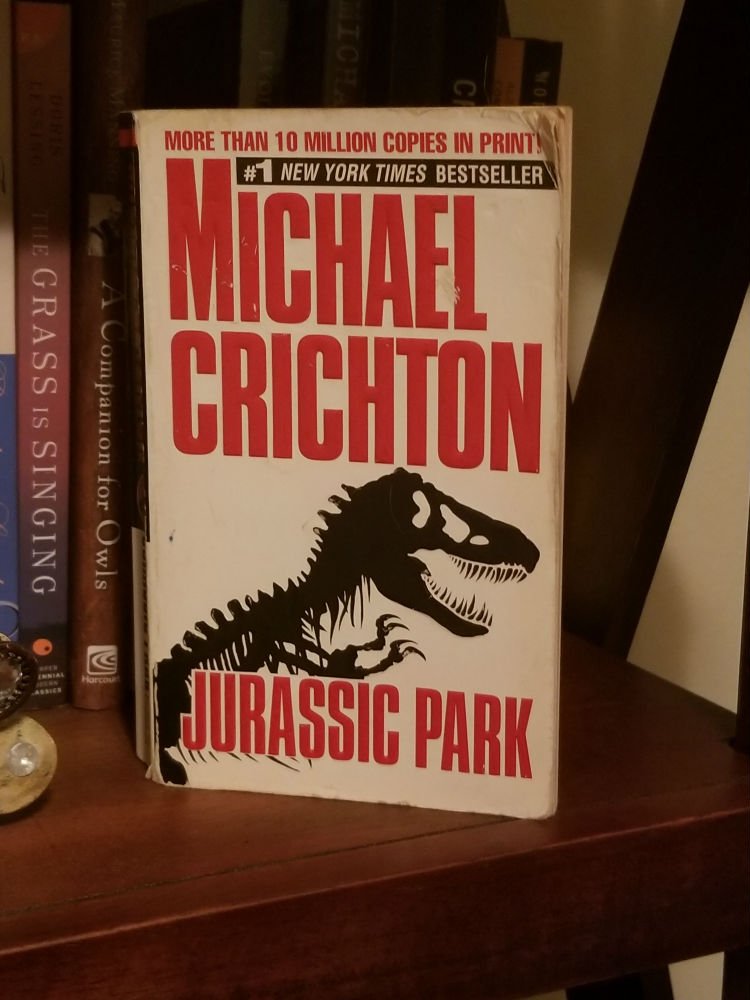I needed a dinosaur fix -

something to placate me until the sequel to Jurassic World releases in June, so I read Jurassic Park. This was my first read-through of Jurassic Park and my first Michael Crichton novel; although, I used to be a devoted ER fan.
In Jurassic Park, dinosaurs are literally brought back from extinction. They are bioengineered by a team of scientists and placed in an "amusement" park on an island off the coast of Costa Rica. There they will entertain and amaze guests and make park owner and visionary John Hammond lots and lots of money. When investors need reassurance that everything is going as planned and there are no problems, experts from various scientific and technological backgrounds are brought to the park to give their seal of approval. They are assured everything is in working order and nothing can go wrong, but of course, things go terribly, terribly wrong.
Jurassic Park is an awe-inspiring, terrifying, cautionary tale about humanity's own hubris. Clocking in at just under 400 pages in the paperback version, it raises the bar of what adventure and suspense look like in novels. It also raises some interesting questions about the real and perceived limits of humanity that are still relevant almost 30 years after the novel was originally published.
In short, I loved this book. This story is more than dinosaurs running amok; although, that is certainly the bulk of the excitement. This novel calls into question what our role is in shaping life on Earth and whether or not we have the right to use our technological prowess simply because we can. Through the fictional narrative, we can see reality clearly, or so it seems when you're reading a novel about a science experiment gone horribly wrong.
From my point of view, Crichton does two things very well in this novel: setup and action. The initial setup for the main plot is long - characters don't arrive at the island until almost 80 pages in. Though story setup takes up a sizeable portion of the novel, it does not feel unnecessary. How all the characters end up going to the island is important. Crichton deftly weaves together the details of each character's story so the reader feels comfortable with the whys and hows behind the fateful weekend excursion to an island with dinosaurs. There are no stones left unturned here.
I was equally pleased with how well the action scenes were written. I've seen authors gloss over action or leave the details up to the reader to imagine, but not Crichton. He grabs action by the claws of the velociraptor and swings into full gear. Action scenes in the book are never over the top or unimaginable (or at least what we might perceive to be imaginable when one encounters a Tyrannosaurus Rex). The most chilling and terrifying moments in the novel are the scenes where the dinosaurs are in full control of their environment and readers and characters alike are at the mercy of these prehistoric carnivores.
Crichton also deserves a lot of praise for choosing to highlight and make two young children such an important part of the story. Choosing to include John Hammond's grandchildren completely changed the stakes and made the story more interesting and multi-faceted. I don't know if children would be so resilient in real life but I like to think so.
Ultimately, I was very impressed that this novel isn't simply a cheap thrill novel. It has real substance and considers real issues that continue to plague humanity. We're not actively trying to bring back dinosaurs from extinction (hopefully); however, we are testing and pushing the boundaries of what we can do with technology every day. Jurassic Park teaches us that good intentions can have bad consequences. Perhaps just because we can do something doesn't mean that we should do it.
Rating: 5/5
Such a classic! I love Crichton.